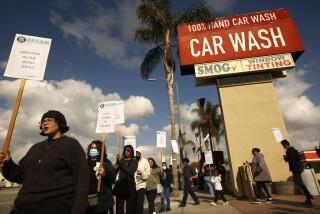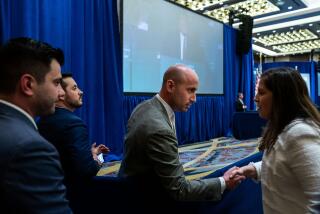Insurance Aside, Are You Vulnerable to a Workplace Suit?
- Share via
Like most business owners, you understand the threat of fire to your operation, and you buy insurance to cover the risk without a second thought.
If you also understand the danger posed by the problem employee, you buy employment practices liability insurance to cover this risk too.
But do you understand that EPL insurance gives you only half of a solution to the problem employee?
It covers you against claims of:
* Sexual harassment in the workplace.
* Wrongful termination.
* Discrimination under the Americans With Disabilities Act.
* Failure to hire or promote because of age, gender, race or religion.
To eliminate the threat of such claims, you must avoid hiring a problem employee in the first place, and give the employees you do hire no cause to complain--a time-consuming process.
Robert Bekken and P. Anthony Burnham, whose Newport Beach law firm Fisher & Phillips specializes in employment law, cite some simple statistics to drive home the point about the risks posed by problem employees:
* Nationally, the number of EPL lawsuits mushroomed from fewer than 8,300 in 1990 to more than 23,000 in 1996.
* In litigious California, the average jury verdict in such cases was $1.3 million in 1996.
These numbers may be jaw-dropping, but you can’t blame them on greedy lawyers or the vagaries of the court system, according to Bekken and Burnham.
Instead, the blame goes to the murkiness of employment law itself--and if you want proof, consider what you discover when you study a typical EPL policy: You’re insuring yourself against your own intentional wrongdoing.
What’s odd here? You can’t collect on your fire insurance if you torch your own business, and you can’t collect on your directors and officers insurance if you cheat your shareholders. But you can collect on your EPL coverage even if, in trial, an employee proves that you deliberately sexually harassed him or her.
Every other kind of insurance coverage follows the principle that it would be wrong to protect those who willfully harm others. EPL stands this principle on its head while insurers and the courts look the other way--a measure of the weirdness of employment practices law.
In selling EPL coverage, insurers do not, of course, seek to encourage wrongdoing, but they do protect it in a unique way, because employment-practices law does not recognize the accidental wrong.
Congress sent the courts, employers and insurers down this strange road when it first made discrimination in employment illegal in the 1964 Civil Rights Act. Congress clearly had large employers in mind when writing the act, according to Bekken and Burnham, and at first it directed that judges, not juries, hear all EPL lawsuits, on the theory that judges were more likely than juries to recognize an employment wrong when they saw one.
As the century ends, however, small business dominates the economy, not big business; nationwide, companies employing 100 or fewer workers constitute 98% of all employers. But employment-practices law affects small and big businesses alike, and to make matters worse, Congress amended the law early in this decade to allow juries to hear EPL lawsuits.
Juries mean big damages awards, of course, no matter what the size of the employer, Bekken and Burnham say.
The good news is that it lies within the power of every employer to blunt this threat, they add.
“Managers control this threat in most situations,” Burnham says, “and the truth is that you can kill two birds with one stone if you practice good management.
“You can get your company in compliance with the 460-plus pages of the California labor code, and you can empower your work force as well if you practice good management.”
Bekken and Burnham counsel their clients to follow seven precepts:
* Don’t hire workers with histories of drug or alcohol abuse.
* Tolerate no sexual harassment and no abuse of drugs or alcohol in the workplace.
* Communicate these and other policies in a clearly written employee handbook--and make sure every employee reads it.
* Tell your employees what you require of them by defining the skills you seek for each position and the performance you expect.
* Measure the performance of every employee regularly and often.
* Resolve disputes rapidly, if necessary with binding arbitration.
* Buy EPL insurance--and call on your insurer for help in fine-tuning everything you do to avoid claims.
“You also have to define what you mean by success in defending yourself against an employment-practices liability claim,” Bekken says. “Success doesn’t mean fighting it until you wipe out your human resources budget. Success means knocking complaints out early. It means resolving complaints internally, before they drag you into court.”
“The payoffs,” says Burnham, “are that you get a better-managed workplace and a reduced insurance risk. That means lower insurance costs.”
The savings can add up too. Employers who make little effort to manage the workplace threat run the risk of getting no insurance at all, says Al Pavoni, senior vice president with the Pasadena insurance brokerage Sullivan & Curtis, a specialist in EPL coverage.
But those who take the threat seriously, he says, can save at least 15% on their premiums.
*
Freelance writer Juan Hovey can be reached at (805) 492-7909 or via e-mail at jhovey@gte.net
More to Read
Inside the business of entertainment
The Wide Shot brings you news, analysis and insights on everything from streaming wars to production — and what it all means for the future.
You may occasionally receive promotional content from the Los Angeles Times.










